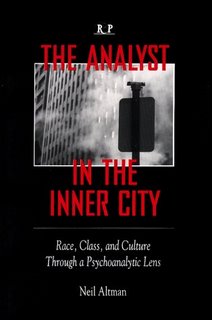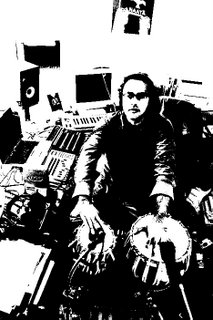
Big up to Roots and Wires Hi-Fi selector Andy G for a wicked set of UK Roots - make sure you check it out (see the link below)!
This saturday, March 25th, Six Degrees Records and Roots and Wires Hi-Fi bring you the third round of Stateless. I'll be out of town, so won't be dropping my dubwise antics, but the lineup looks stellar:
MC Rai performing live with Jef Stott (Embarka Records) and Omar Fadel...
Guest dj's from Chicago's 'Bombay Beatbox' crew: Warp and Radiohiro
and a dj set from resident dj, D. Wurker
"Psychoanalysis Meets the Inner City," refers to a UCSF Department of Psychiatry event I've organized. This thursday, March 23rd, there will be a special two-part presentation and clinical case conference at the San Francisco General Hospital - "Psychoanalysis Meets the Inner City." Neil Altman, author of "The Analyst in the Inner City: Race, Class and Culture Through a Psychoanalytic Lens," and co-editor of "Psychoanalytic Dialogues: a Journal of Relational Perspectives" (a major journal for contemporary psychoanalysis), will be visiting from New York City to speak on the value of modern psychoanalytic perspectives in public-sector work. The lunch and evening events will be open to providers and trainees throughout the city, so send me an e-mail @ bruceleehifi@hotmail.com if you're interested in checking it out...
The emphasis will be on the value of contemporary psychoanalysis in inner city work - let me paraphrase some perspectives from Dr. Altman's book:
Classical psychoanalysis emphasized the need for analytic anonymity and abstention from action, which isn't really possible in most public sector settings where there are multiple domains in which the therapist needs to be more active. For example, the therapist often also provides active case-management functions such as working towards housing and government entitlements (such as SSI). These far from neutral actions would have been considered incompatible with a classical psychoanalytic approach, but are not incompatible when the analyst's subjectivity and presence are acknowledged and revisioned in the contemporary, relational psychoanalytic frame.
The classical criteria for "analyzability" often excluded most patients served in the public sector, since there was an emphasis on the capacity to tolerate frustration and on verbal intelligence. Relational or intersubjective psychoanalysis, focuses more on the capacity to utilize relationship, so this opens up new and less exclusionary possibilities for "analyzability."
In intensive case management programs, case managers often visit patients in their environment, which can intensely pull for enactments of object-relations related to early attachment figures. Thus "case managers may appear to their patients as omnipotent rescuers, controlling and punitive intruders, potential rapists, lovers, friends and so on." Contemporary psychoanalytic perspectives can help make sense of these enactments and the various countertransference/transference manifestations that can arise. This is one example in which these perspectives are useful clinically in the public sector, even outside of psychoanalytically informed individual psychotherapy...
Classical psychoanalysis has been described as a "one-person psychology," where the analyst was a considered a blank slate for the patient's transference projections. This gradually developed into what has been referred to as a "two-person psychology," where the analyst is acknowledged as a subjective being with his own presence in the relational field. Finally, in a "three-person psychology, " the "third," refers to the systems and sociocultural context in which the therapeutic dyad is embedded, allowing us to more reflexively take into account things such as race, class, and subculture/culture...
... As I write this a Heptones song ("World") comes to mind, bringing us back to roots music:
World, for everyone…
But somethings are shared only by some…
... And we'll leave this post with some words, a fitting invition of sorts, from Aswad ("Pass the Cup"):
And yes my friend I know it's not hard to see,
What's good for you is so good for me...
Pass the cup,
Pass the cup,
You let it touch your very very soul,
Pass the cup I beg you, pass the cup around from one to another...

No comments:
Post a Comment